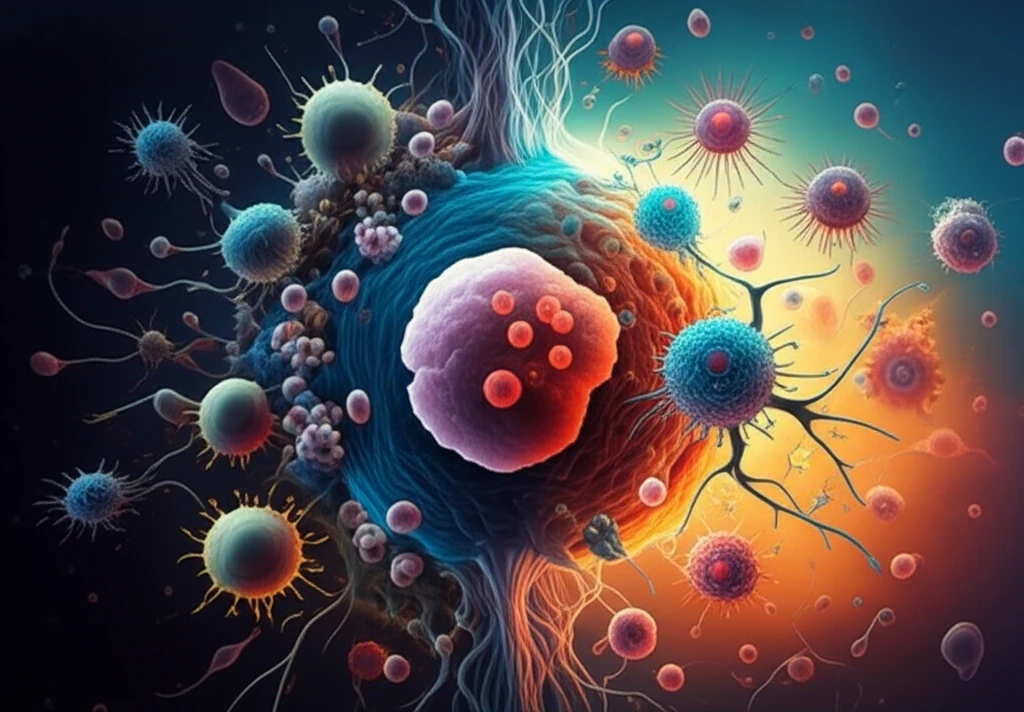
Turning the Tide: How to Make Breast & Pancreatic Cancer Respond to Immunotherapy
"New research reveals how a drug called entinostat can reprogram cancer cells to respond to treatments they were once resistant to."
Immunotherapy, particularly immune checkpoint inhibition (ICI), has transformed cancer treatment, especially for cancers easily recognized by the immune system. However, breast and pancreatic cancers, with their complex and suppressive tumor microenvironments (TMEs), remain challenging, showing low response rates to ICI. These tumors often recruit myeloid-derived suppressor cells (MDSCs), which hinder T-cell activation and infiltration, critical for successful immunotherapy.
A promising strategy involves epigenetic modulation to target MDSC trafficking and function, creating a TME that's more receptive to immune attack. This approach aims to make these stubborn tumors more responsive to ICI, boosting the chances of effective treatment.
New research explores using entinostat (ENT), a histone deacetylase inhibitor, in combination with ICI, such as anti-PD-1 and anti-CTLA-4. The results indicated significantly improved tumor-free survival in models of HER2/neu transgenic breast cancer and metastatic pancreatic cancer, offering hope for overcoming treatment resistance.
Reprogramming Immune Cells: How Entinostat Changes the Game

The study used mouse models to mimic breast and pancreatic cancers, employing flow cytometry, gene-expression profiling, and functional assays to deeply analyze tumor-infiltrating lymphocytes (TILs) and MDSCs. The goal was to understand how entinostat, when combined with checkpoint inhibition, affects these immune cell populations and their functions within the TME.
- Reduced Suppression: Entinostat decreases the suppressive effects of granulocytic MDSCs, key cells that normally shut down the immune response in tumors.
- T Cell Activation: The treatment boosts the activity of CD8+ T effector cells, which are essential for directly attacking and destroying cancer cells.
- Gene Expression Changes: Both MDSCs and TILs showed significant changes in immune-related pathways, indicating a reprogramming of their functions.
Hope for the Future: What This Means for Cancer Treatment
This research highlights the potential of entinostat to transform immune-resistant cancers into more manageable and treatable conditions. By altering the tumor microenvironment and enhancing the effectiveness of immune checkpoint inhibitors, entinostat opens new avenues for combination therapies.
These findings have significant implications for clinical trials and patient care, suggesting that combining epigenetic modulators like entinostat with immunotherapy could improve outcomes for those with breast and pancreatic cancers. Current clinical trials (NCT02453620 and NCT03250273) are underway to further explore combining entinostat with immunotherapeutic agents.
Ultimately, this approach aims to harness the body's immune system more effectively, providing new hope for patients with some of the most challenging cancers to treat. Further research and clinical application promise a future where even the most resistant tumors can be made vulnerable to the power of immunotherapy.
